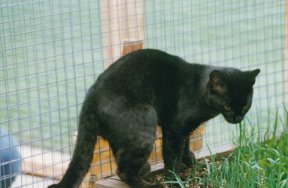

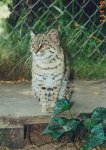
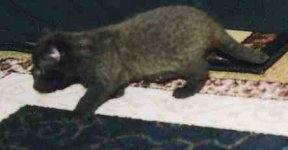




To start with, owning an exotic animal should never be taken lightly. This can be a 20 year commitment and will change your life and take away your freedom of taking a vacation when you want.
The small exotic cat can be sweet if raised correctly and with a lot of human interaction. But that is true with any animal domestic or exotic. These guys are sweet, intelligent, and will bond with more than one person if raised so. Some small exotic cats need constant interaction to aintain the friendly domestic nature. This is more true of the Asian Leopard Cat than the Geoffroy Cat. Asian Leopard Cats have one of the highest percentages for reverting to shy tendencies if not interacted with regularly.
Captive owned small exotic cats needs the same consideration as domestic cats with a few minor exceptions.
I have to say that the smaller the exotic the more intelligent they are. Our Geoffroys Cats have been observed opening doors, drawers, cupboards, boxes, and anything else that they can figure out. We have installed the child - proof latches as well as magnets to our cupboard doors. We have one little Geoffroy that was/is able to open the child - proof latches so we had to add the magnets as well.
A potentially big issue is their sometime potty habits. Some Asian Leopard Cats and first generation hybrids, like to potty in water. Geoffroy Cats are not so prone to this habit but it can happen. This could mean they will potty in the bathtub, sink, water dish, or any shiny surface. Also, They may be more prone to marking and peeing to get back at you. Getting back at you can be because you leave them or punish them. You may have to have several litter boxes throughout the house to meet the cat?s needs. Especially when they are young and in the training phase of their life. We have a litter box in every room and this seems to work great. Babies and young kittens are still learning so they may have to have the litter box in the middle of the room. You can slowly move it to where it will be so that kittens can get used to having it near by.
To reprimand an animal, we recommend a squirt bottle with water and/or time out. We give three warnings then time out. Short phrases are best with any animal No Bite is one we use from the time the kitten is pulled. What ever you do it must be consistent the number of warnings, the phrases, the time out makes no difference as long as you are consistent.
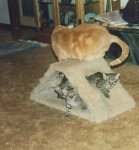
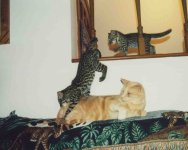
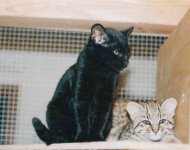
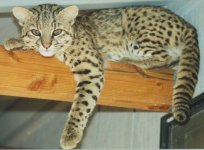
Outside enclosures are always nice and allow the cat to fresh air and sunshine. The enclosure needs to have a security entrance and the wire gap should be small such as welded 1 x 1 or 1 x 2. Your average chain link provides too wide a gap and they can get their heads, if not their entire body through. Also, a perimeter fence is mandatory with any exotic and should be a minimum of six feet tall for the small cats and three feet from the enclosures.
Small exotic cats, same as a lot of other exotics, tend to chew and eat things they cannot digest. So care with plastics and cloth, if your particular animal should be one that eats cloth. They do appear to do well with waffle balls, and tennis balls and like to toss and catch things. They also enjoy hide and seek but do take care not to use your hands or any body part as a toy. With toys always keep a check on them. When they become warn, replace them. Loose ends can be eaten off and cause digestive problems in your animal.
Your small exotic cats also enjoy snuggling and the company of humans. But some like the Geoffroy, seem to be really fond of toes. So you may need to wear shoes to protect your toes from being nibbled on. Do keep in mind that most exotic cats are prone to be up at night. This can affect your ability to sleep. Many exotics if entertained during the day, will get the idea to sleep at night. And young exotics and domestics like to play a lot. So you may need to confine your cat when there is no human supervision just for safety. Once they are older and mature this may not be necessary. But there is always the chance that leaving your cat run loose in your house when you are not home is not a safe practiced just because of the nature of the individual cat.
I do not fast my cats but there are many that do. So on that subject it appears to be a personal preference. I find they have a happier disposition with not being fasted and fed twice a day, but there could be others that state for health reasons fasting is preferred. We are currently feeding our cats raw turkey drums with Oasis Calcium and Oasis Vitamins with Taurine ? these are two (2) products we mix together and feed. Our vitamins and supplements come from Apperon (apperon.com). The additional calcium is because the exotic cats like poultry, which is high in phosphorus so you need the additional calcium to create the 2 calciums to one phosphorus dietary requirements. As treats we give lean beef, gizzards, hearts, and liver. This diet has been the best for us and our cats and their overall health and wellbeing. We have had the largest litters with this diet and our cats appear to be happier than when we had them on processed food. Keep in mind, cats are strict carnivores so they do not digest carbohydrates and too many carbohydrates can give them the poo poos. Also watch what raw poultry you buy. Many of the manufacturers add flavor enhancers to the raw meat. If these flavor enhancers are more than 5% it does give the cats the poops. Tyson brand is one that add over 19% flavor enhancers and all of our cats get sick on this if they do eat it. Foster Farms is one we have had great luck with and has less than 5% flavor enhancers.
When securing an exotic from a breeder, always ask for their USDA/USDI number and don't be afraid to ask for references. For more information about USDA licenses and the animal welfare act, visit the USDA Animal Care website at (aphis.usda.gov/ac/)
Also concerning laws, it is not legal to sell exotic without a USDA permit. This even includes a onetime sale. If the seller purchased the cat/animal as a pet or to do hybrid breed and now want to sell it THEY NEED A USDA ONE TIME SALE PERMIT. Please do not encourage illegal sale. And if you are a seller, please adhere to state, county, and city laws that prohibit owning exotics and not sell to someone who lives in an area where exotics are prohibited just because you can get away with it.
The exotics seem to have a real attraction to plastic so keep all plastic bags and rubber gloves so keep them under lock and key. I know I said this earlier but it cannot be said enough. Also, watch for your little beds that you get. Many have the foam inside. If the fabric should get a tiny rip the cat can get at the foam and ingest and possibly die before you know what happened.
Also, carry a card in your wallet or purse next to your driver's license for emergencies letting someone know that you have animals at home and give two emergency name and numbers to contact. Make sure that your contact names have access to your home so that they can get in a feed and care for the animals. And make sure that your contact persons know what and how to feed.
Set aside funds to relocate your cat if necessary if something should happen to you. This will make the move swifter and with less hassle. It may mean that the person that will be taking your animal is not close. So you will need someone near you who can care for your animal and make the arrangements to get the animal to their final new owner.
Make sure that you have for your emergency person a list of:
What and when to feed
Keys to the enclosure
Who your vet is and their address and phone number
The person that has agreed to care for your cat permanently, if different than the emergency person
Where carriers and supplies are located
How to access emergency funds
Instructions for the best means of placing each cat in a carrier for transport. Each animal is different and may require different means to get into a carrier.
Anything that can be unique to each cat that will help while you are away to make the transition for the cat as easy as possible (i.e. favorite toy, special treat, a soiled shirt of yours with your smell on it)
The location of the animals health record or any other records that may be needed.
These little guys will steal your heart
From our breeding and research center
If you would like to contact us:Cocoa
Home (Home Index)